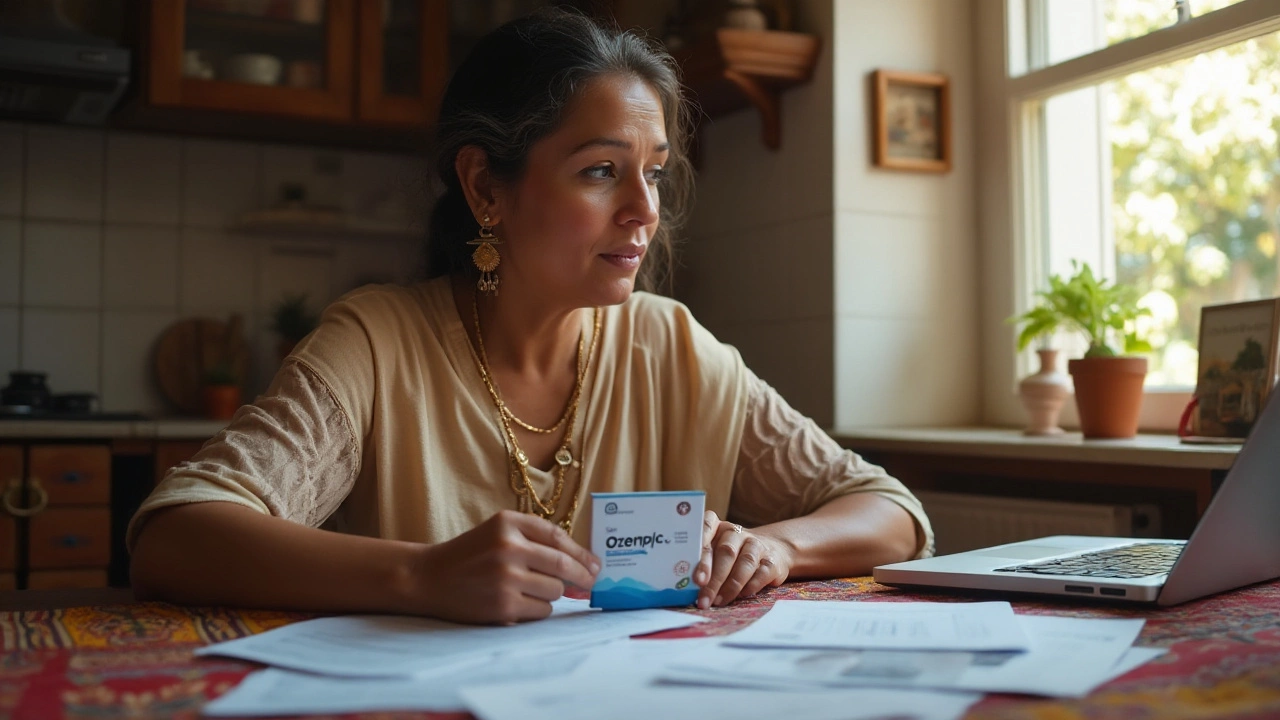Ozempic has become a well-known name, especially among those managing type 2 diabetes. This medication not only assists in controlling blood sugar levels but also offers added benefits such as potential weight loss. As amazing as it sounds, one critical question hovers: will your insurance cover it?
The pharmaceutical landscape is complex and insurance policies can be quite the puzzle, especially when it comes to newer medications. It's crucial to understand how insurance companies decide what to cover and what might lead them to deny a claim. This knowledge is key in maneuvering through the healthcare maze to secure the medications you need.
- Understanding Ozempic and Its Uses
- Insurance Policies and Drug Coverage
- Why Insurance Might Deny Coverage
- Navigating Your Options
Understanding Ozempic and Its Uses
Ozempic, known generically as semaglutide, is a medication that has seen a surge in interest over recent years, particularly within the realm of type 2 diabetes management. Developed by the pharmaceutical company Novo Nordisk, this once-weekly injectable drug is part of a category known as GLP-1 receptor agonists. These medications work by mimicking the functions of incretin hormones, which play a role in insulin secretion. When blood sugar levels start to rise after meals, Ozempic helps stimulate the pancreas to release insulin. This mechanism not only assists in controlling blood glucose levels but has also been linked with moderate weight loss, making it a dual-benefit option for patients.[1]
One notable advantage of Ozempic is its convenient dosing schedule. Taken once a week, it offers a more manageable routine compared to daily dosages required by some other diabetes medications. This feature enhances compliance among users, particularly those who find it challenging to stick to complicated medication regimens. Moreover, research indicates that Ozempic can reduce the risk of major cardiovascular events, such as heart attack and stroke, in adults with type 2 diabetes and established cardiovascular disease. This aspect provides an additional layer of protection for individuals who are already at higher risk of heart-related issues.
"Ozempic has made strides in transforming how we approach diabetes management, not only by helping to regulate blood sugar levels but by offering cardiovascular benefits. This dual impact makes it a standout among diabetes treatments," - Dr. Emily K. Burns, Endocrinologist at Imperial College Healthcare.
In terms of efficacy, Ozempic has demonstrated substantial potential in clinical trials. Patients have reported significant reductions in HbA1c levels, a marker used to determine blood sugar control over time. In studies, it often outperformed other diabetes treatments, positioning itself as a leader in the field. It's important to note that while Ozempic is beneficial, it is typically prescribed alongside lifestyle modifications such as a balanced diet and regular physical activity. This holistic approach is vital in achieving optimal outcomes and managing diabetes effectively.
Despite its benefits, Ozempic isn't suitable for everyone. It's crucial for patients to discuss their complete medical history with their healthcare provider to determine if it's the right fit. Some individuals might experience side effects such as nausea or digestive issues, especially when they first start using the medication. However, these symptoms often decrease as the body adjusts to the treatment. Because it is a relatively new player in the field, long-term effects are still being studied, although current data supports its safety and efficacy.
Given its benefits, the surge in demand for Ozempic is not surprising. Maintaining good blood sugar levels is a lifelong commitment for those with diabetes, and medications like Ozempic can make this journey less daunting. By understanding exactly how Ozempic works and what it offers, patients and healthcare providers can make informed decisions to better manage diabetes and improve quality of life.

Insurance Policies and Drug Coverage
Insurance policies can often seem like a maze, filled with intricate terms and conditions that can be difficult to decode. When it comes to covering medications like Ozempic, these policies can be even more complex, largely due to the drug's relatively new introduction to the market and its price point. Insurers evaluate a drug’s necessity and efficacy, considering factors like FDA approval and clinical benefits. Knowing these aspects is essential as it helps set realistic expectations and strategize for potential coverage pathways.
The coverage for prescription drugs such as Ozempic is typically categorized under the pharmacy benefits of an insurance plan. It's crucial to understand that not all plans are created equal; while some might cover Ozempic without hesitance, others may list it as a non-preferred drug, resulting in higher co-pays or outright denial. Copay tiers can significantly affect financial accessibility, with generic drugs usually occupying the lowest tier and higher-priced brand-name drugs like Ozempic sitting on the higher end.
Additionally, the prior authorization process can be a hurdle for many. This step requires healthcare providers to supply evidence to support the necessity of a medication like Ozempic before the insurer agrees to cover it. This requirement stems from a strategy to manage costs and ensure that high-cost treatments are used appropriately. Therefore, effective communication with healthcare providers and insurers is vital in these scenarios. Anecdotally, I've heard many patients express frustration over this red tape, but persistence coupled with well-documented medical necessity often yields positive outcomes.
Interestingly, a study by the American Diabetes Association highlighted that coverage for diabetes management medications varies dramatically across plans, and consumers are often left in the dark about these nuances.
"Patients often feel left out of the conversation regarding their medication coverage," Dr. Emily Harris of the ADA once remarked, underscoring the importance of patient advocacy.Awareness and proactive inquiry into one's specific insurance provisions can alleviate some of the uncertainties associated with securing access to medication like Ozempic. It might also be beneficial to consult with a healthcare provider who can advocate on behalf of patients, aiding in simplifying the authorization process and ensuring appropriate justification for use.
To enhance your understanding, you might consult the summary of benefits provided by your insurer or engage with their customer service for clarification on the pharmacy benefits structure. Not to mention, the exploration of supplementary savings programs directly from drug manufacturers could serve as a financial cushion. Facilities like these are sometimes underutilized, yet they can offer significant relief for those struggling to meet the cost of their prescription medications when insurance coverage is partial or non-existent.

Why Insurance Might Deny Coverage
Insurance coverage for medications like Ozempic can often be a tricky subject filled with complexity, uncertainty, and occasionally, outright denial. Let's unravel why insurance companies might decide not to cover this essential drug. One significant factor is the cost associated with Ozempic. Since it’s a relatively new and high-demand medication, insurance companies scrutinize its expenses closely. They often weigh the benefits of covering the drug against its financial impact on their resources. Cost-benefit analysis drives many of these decisions where coverage might be denied if insurers believe there is a cheaper alternative available.
Additionally, insurers may deny coverage for Ozempic based on their listing within the drug formulary, which functions as a list of medications that an insurance plan prefers due to negotiated pricing and deals. If Ozempic is categorized as a higher-tier drug, patients may face more barriers in having it covered. There's also the medical necessity criteria. Insurers sometimes require detailed documentation from doctors proving the drug is essential for the patient and not just a preference. If they determine the medication is not medically necessary, coverage could be denied.
The role of step therapy is another element that could impact insurance decisions. This policy essentially requires patients to try and fail on lower-cost medications before approving treatments like Ozempic. It can cause delays and denials as insurers push for cost-saving alternatives. Lastly, prior authorization plays a key role in these dynamics. This is a process where healthcare providers must obtain approval from the insurer before prescribing Ozempic, which can lead to coverage being denied if the pre-approval isn't granted.
According to a 2023 report by the National Health Council, "92% of patients reported that prior authorization was a significant barrier to accessing necessary medications." This emphasizes the need for advocacy and diligent follow-up with both doctors and insurance providers.
Understanding these factors allows patients to anticipate potential denials and prepare accordingly. By equipping themselves with knowledge and collaborating with healthcare providers, they can challenge these denials and seek alternative solutions efficiently. Armed with insights and persistence, navigating the healthcare maze of insurance and Ozempic becomes a manageable, albeit challenging, endeavor.

Navigating Your Options
Securing insurance coverage for Ozempic might seem daunting, yet understanding your options can make a significant difference. When dealing with possible denials, the first step is to carefully review your health policy's prescription drug plan. Knowing whether Ozempic is included in your plan’s formulary is crucial. The formulary is a list of medications your insurance company agrees to cover, either fully or partially. Contact your insurance provider and ask direct questions about your specific plan’s stance on Ozempic; this can save you both time and frustration down the road.
If you find Ozempic is not covered, don't lose hope just yet. Several strategies can help you get the coverage or the medication you need. One approach is discussing alternatives with your doctor. Often, insurers have preferred drugs that perform similarly to Ozempic and are more likely to be covered. If no suitable alternatives are available, your doctor may assist by providing the insurer with evidence of medical necessity. This process, known as a Prior Authorization, can make a compelling case for coverage by demonstrating why Ozempic is essential for your health over less expensive options.
Exploring Assistance Programs
Another avenue to explore is pharmaceutical assistance programs. Companies like Novo Nordisk, which manufactures Ozempic, have initiatives to help individuals who cannot afford their medications. These programs often require that you meet certain income thresholds but can offer the drug at a reduced cost or even for free in some cases. It's worth checking their eligibility requirements and seeing if you qualify. Notably, many patients have successfully obtained their medications through these channels, providing a lifeline when insurance policies fall short.
Additionally, there is the option to use pharmacy discount cards, which can significantly lower your out-of-pocket costs for medications like Ozempic. Websites and apps like GoodRx and SingleCare allow you to compare prices at different pharmacies in your area. Some of these platforms have partnerships with pharmacies, offering exclusive discounts that can make an unaffordable drug more reachable. However, it's vital to verify whether using these discounts impacts your insurance coverage or not.
"Each year, nearly 38% of Americans skip filling their prescriptions due to cost," according to a report from the Centers for Disease Control and Prevention (CDC). This highlights the importance of exploring every available option to ensure access to necessary medications.
Keeping an Open Line of Communication
Lastly, maintaining open communication with healthcare providers and pharmacists can be invaluable. They often have insights or can point you towards additional resources that you might not have considered. Some clinics and pharmacies offer their own in-house savings programs or payment plans to make treatments more accessible. By actively engaging with your healthcare team and being upfront about your financial concerns, you may find unexpected pathways to getting the coverage or assistance you need for your Ozempic prescription.
